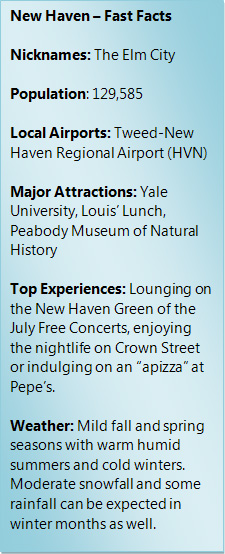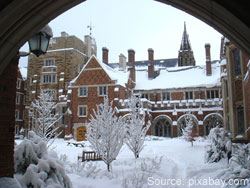 It's the birthplace of former President George W. Bush and the second largest city in Connecticut, famous for the Ivy League Yale University, its pizza and the iconic "Louis' Lunch" fast food eatery. New Haven might not envoke as much buzz as some other New England cities, but is attractive in its own right, with plenty to do, see and enjoy.
It's the birthplace of former President George W. Bush and the second largest city in Connecticut, famous for the Ivy League Yale University, its pizza and the iconic "Louis' Lunch" fast food eatery. New Haven might not envoke as much buzz as some other New England cities, but is attractive in its own right, with plenty to do, see and enjoy.
Are you unsure about moving to New Haven? If you need help to decide, read through this guide for information regarding your potential new city, as well as useful relocation tips. Make your transition as seemless as possible by getting a free moving quote right here at Movers.com.
New Haven Climate
Get ready for four distinct seasons if you're moving to New Haven. While the climate in the city has characteristics of both humid continental climate and humid subtropical climate, the seasons are distinct enough that the humid continental climate is more prominent.
Summers are generally humid and warm, with hotter temperatures going above 90- degrees. Winters are cold and have an average amount of snowfall and occasional rain. The average high in winter months (December through February) is approximately 40-degrees.
New Haven Neighborhoods
For a taste of city life, Downtown New Haven may be the place for you. It's home to the New Haven Green, a privately owned 16-acre park which is bordered by College, Chapel, Church and Elm streets and holds numerous public events. While it is home to the central business district and many restaurants, theaters and cafes, Downtown New Haven is also one of the most residential downtown areas in the country.
Other residential areas in the city include Dixwell in the west central part of the city that contains a large portion of Yale's Campus; the Hill and City point to the south, comprised of large buildings like Yale-New Haven Hospital and scattered with working-class neighborhoods; Prospect Hill and East Rock to the north, home to many Yale students and staff; and Mill River (mostly industrial) and Wooster Square to the east, home to Frank Pepe Pizzeria Napoletana.
Registering Your Car
Upon moving to Connecticut, the state gives you 60 days to transfer your vehicle registration to a Connecticut one. Your Vehicle Identification Number (VIN) and emissions test is required. You will need a copy of this test, your out-of-state title, an application for registration, proof-of-insurance and proper identification when going to the DMV to register your car.
Once you are an official resident of Connecticut, you will have 30 days to transfer your out-of-state license to Connecticut. You'll need to present your out-of-state license when you make the change, and it must not be expired for more than two years. Before you are issued your license, a vision test will be administered – road tests may be waived based on the licensing agent's discretion. You will have to bring multiple forms of identification, fill out an application form along with an application fee, and pay a license fee of $72 or $84 dollars, depending on how long the license will be valid for.
New Haven Schools
 Students in the public education system will attend school within the New Haven School District, which serves the entire city. Wilbur Cross High School and Hillhouse High School are the city's largest public secondary schools, and the district claims over 40 schools in the area. In addition, the city is home to a number of notable private and magnet schools.
Students in the public education system will attend school within the New Haven School District, which serves the entire city. Wilbur Cross High School and Hillhouse High School are the city's largest public secondary schools, and the district claims over 40 schools in the area. In addition, the city is home to a number of notable private and magnet schools.
For higher education, the city has plenty of options including its Ivy League claim to fame, Yale University, located in the heart of downtown. Other higher education institutes in the area include Southern Connecticut State University, Albertus Magnus College and the University of New Haven in close-by West Haven.
New Haven Employment
The city used to be known for manufacturing, but now over half of the economy is centered on services, including education and health care. Yale University is the city's largest employer, followed by Yale-New Haven Hospital, St. Raphael Hospital, Smillow Cancer Hospital and Southern Connecticut State University.
The area has been losing jobs steadily over the last year, mostly in the trade, transportation and utilities sectors. However, the area's unemployment rate has been steadily decreasing, sitting at approximately 8.5 % as of March 2013.
Living Costs in the City
To live in New Haven, you'll need to have the income to support it, as the overall cost-of-living is over 15 % higher than the national average, with utilities and miscellaneous entertainment costs being the biggest contributor to that average. The average family income is approximately $100,000, while the average home is approximately $270,000. However, some homes can climb to the multi-millions depending on size and location. One-bedroom apartments average at approximately $800 per month minus utility costs.
Electric costs for a small apartment can be as low as $40 a month in the fall and winter without running heat, but can exceed well over $300 for a larger size home with average usage.
New Haven Moving Resources
Moving and storage companies are anxious to assist you with your move to New Haven, whether you're moving from out of state or from another county in Connecticut. Make sure you get estimates from multiple moving services before you commit to hiring any (at least three estimates). Check back to our guides for tips on how to choose your moving service wisely with important questions to ask, differentiating between types of estimates, and mistakes to avoid. Visit the following pages at Movers.com to get quotes for the following services:
New Haven Transportation
If you're a commuter by public transportation, you'll have a good amount of options living in this city. You can get to New York City via Metro-North Railroad services, which provides a commuter rail. Shore Line East provides another commuter rail, and Amtrak provides a regional and intercity rail. The city's stations are Beaux-arts Union Station and State Street Station.
For traveling by bus, the New Haven Division of Connecticut services the city with 24 routes. There are also various shuttles provided throughout the city, including the Yale University Shuttle.
Interstate 95 runs through the city, and provides access south or west to other parts of Connecticut and New York City, and east towards Rhode Island. Other major commuter roads include Interstate 91, Connecticut Route 34, Connecticut Route 15 and U.S. Route 1.
Culture & Contemporary Life
 If you move to this city, you won't run out of things to see and places to eat! With over 50 Zagat-rated restaurants, this New England city has a variety of cuisine for almost everyone. There are over 120 restaurants within the New Haven Green with Mexican, Thai, Italian, Jamaican, Cuban, Turkish and Indian restaurants. For a taste of New Haven's "apizza", visit Frank Pepe Pizzeria Napoletana (or "Pepe's"), or go to Louis' Lunch for a hamburger.
If you move to this city, you won't run out of things to see and places to eat! With over 50 Zagat-rated restaurants, this New England city has a variety of cuisine for almost everyone. There are over 120 restaurants within the New Haven Green with Mexican, Thai, Italian, Jamaican, Cuban, Turkish and Indian restaurants. For a taste of New Haven's "apizza", visit Frank Pepe Pizzeria Napoletana (or "Pepe's"), or go to Louis' Lunch for a hamburger.
There are many production houses and theatres in the city, including long Wharf Theatre, Shubert Theatre and Yale Repertory Theatre. For some American history, you can take a trip to the Eli Whitney Museum, or the Yale Center for British Art, which has the largest collection of British art outside of the U.K.
The city is home to many different festivals throughout the year to enjoy, like the Jazz Festival, the annual International Festival of Arts and Ideas, the annual Wooster Square Cherry Blossom Festival and New England's oldest St. Patrick's Day Parade. Head down to the Toad's Place concert venue to enjoy many different styles of music like indie, rock and underground hip-hop.
New Haven Relocation Tips
-
The city's economy relies heavily on Yale University – it may be helpful to explore employment options within the school if you aren't moving to the city for higher education.
-
There are four seasons in New Haven, so if you're moving from a climate that is more consistent, make sure you plan your wardrobe accordingly.
-
Get involved in your community. Find out about any local committees you can become part of in order to meet your neighbors and stay connected to what's going on in your area.